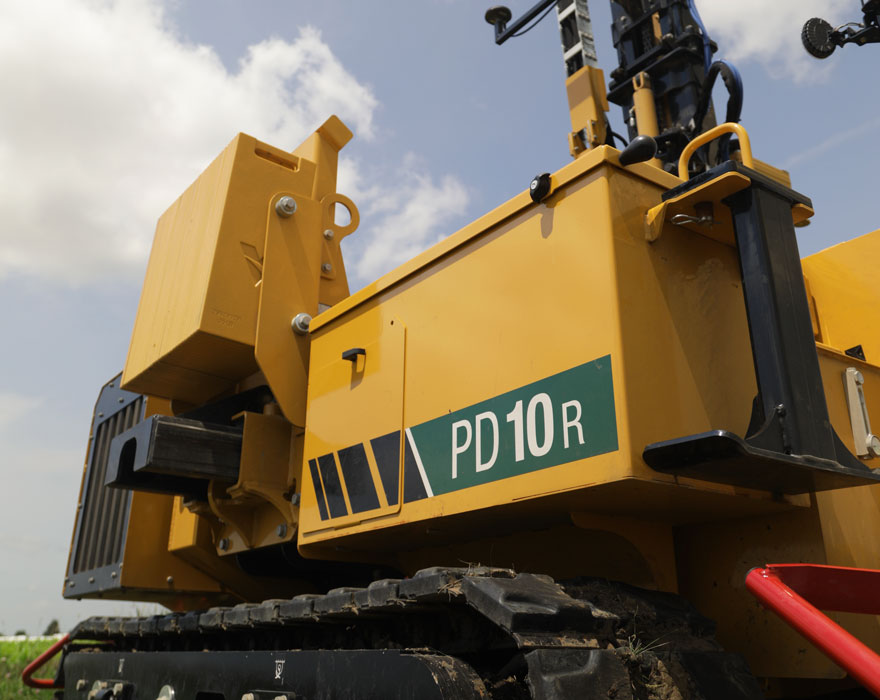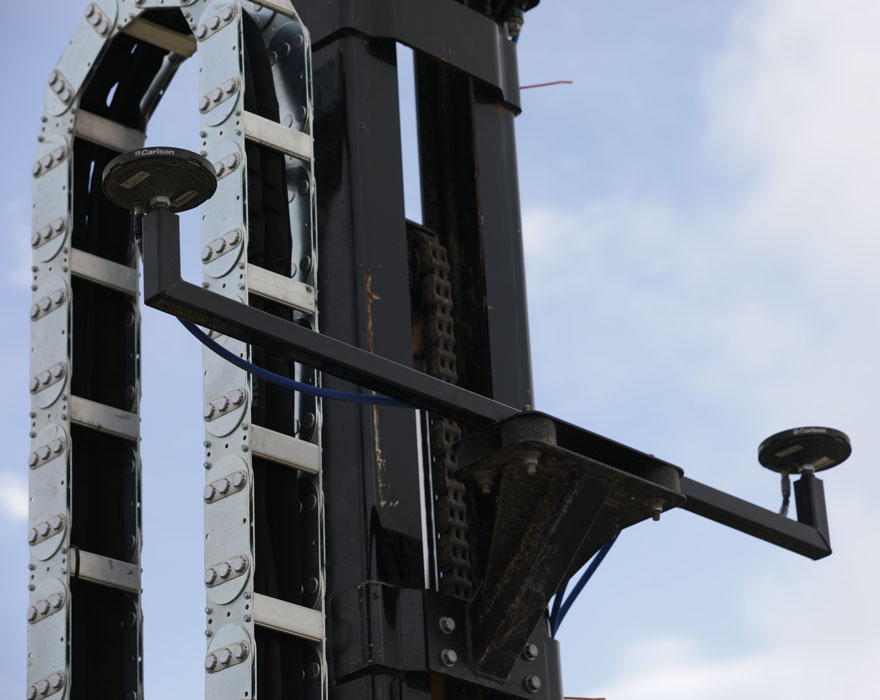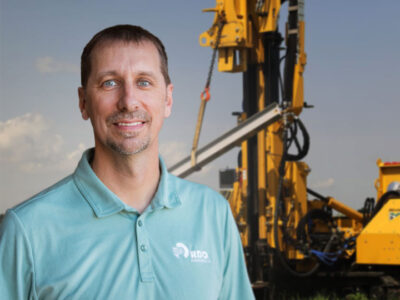Renewable energy sources like solar are gaining worldwide attention, sparking a construction boom in new areas. However, similar to other construction segments, labor shortages present significant challenges for contractors in solar construction. These emerging markets are also still in the early stages of identifying the most efficient work methods, which further compounds the challenges of working in a new area.
Fortunately, contractors working with Vermeer dealers, such as Vermeer RDO, do not have to navigate these obstacles alone. They have a dedicated team that assists customers in discovering and implementing technology and equipment solutions for emerging markets, including solar. Led by Tom Potter, the general manager of emerging technology markets for RDO Equipment Co., this team diligently collaborates with equipment manufacturers and technology providers to deliver application-based solutions to some of the most challenging areas in various industries.
A case for GPS technology on solar construction projects
Solar construction companies often face the challenge of labor and time-intensive site surveys.
“Traditionally, marking each pile location at a solar site involved hiring surveyors to physically place markers like feathers, flags or stakes into the ground,” Potter explained. “This resulted in substantial labor costs, especially for larger projects with numerous pins. Switching to GPS technology eliminates the need for physical markers, as well as the need for string lines for orientation and rotating lasers for elevation. So, not only does this technology offer significant cost savings, but it also streamlines the construction process.”
Potter went on to say that one solar contractor his team worked with reported saving over 1.3 million dollars in surveying costs on a single project by integrating Vermeer PD10R pile drivers with GPS technology. Moreover, this technology investment paid off for that project and will continue to yield profit in future projects.

Adopting proven technology
The integration of GPS technology is an emerging trend in markets like renewable energy construction, although it has been used in various construction applications for years.
Potter has been engaged with GPS machine control technology since 2005. He initially worked with Topcon machine control products in the construction industry before joining RDO in 2009. At that time, the company began investing more heavily in the intersection of equipment and technology.
During this time, much of the focus was on dirt work in the construction industry. However, Potter recognized over time that they could assist numerous other markets.
“More niche markets and equipment could benefit from the GPS technology commonly used on dozers, excavators and haul trucks,” Potter stated. “However, it would require a collaborative effort with equipment manufacturers, technology providers and dealers working with contractors in more niche markets to make it a reality. Vermeer is one of the companies focused on solving many of the same challenges we set for ourselves. And since the solar industry involves a lot of repetitive activities, implementing GPS technology makes sense.”
In 2023, RDO established an Emerging Technology Markets role for the business and Potter was promoted to general manager over that function.
Designing machinery to integrate with technology
According to Potter, Vermeer excels in developing equipment with its own built-in technology while also being adaptable to authorized third-party GPS integration to automate some functionality. This is a significant advantage for companies seeking technology solutions to address skilled labor issues.
“The Vermeer team designs machines to integrate with the latest authorized GPS systems from the beginning of their product development plan, placing it at the center of their work,” said Potter. “They are considering how this integration will work by seeking feedback from customers and dealers, as well as input from the GPS manufacturers. They’re taking a holistic approach, considering all aspects from beginning to end product development.”
The integration of GPS into Vermeer pile drivers to help control solar surveying costs has already been widely implemented. The next step is automating other common pile installation tasks. This is being done on the Vermeer PD10R pile driver equipped with the point-to-point (PTP) system to minimize the number of manual steps required for machine positioning and alignment. This innovation reduces the operator’s input steps per cycle from 11 to 4.

“GPS systems are typically installed at the dealership. That’s why contractors must choose their partners wisely,” said Potter. “Progressive manufacturers, technology providers and dealers can deliver an integrated operator experience. Without it, the process is less intuitive.”
Preparing contractors for future solar construction
As the solar construction industry continues to evolve, the adoption of technologies like GPS and specialized training is proving to be revolutionary. Contractors, guided by partners like Vermeer and its extensive dealer network, are discovering innovative methods to enhance efficiency and reduce costs. With technology at the helm of operations, the solar construction industry is well-positioned to overcome labor shortage challenges and other hurdles.
“Technology has proven to be a valuable tool that helps contractors perform their jobs more effectively and efficiently,” said Potter. “The primary message we communicate during the adoption process is that technology is simply another instrument at their disposal. We’ve observed that most operators who take great pride in their work have found that technology significantly enhances their job performance and efficiency. This cycle continually repeats itself as technology evolves.”
To help contractors incorporate new technology into their equipment fleet, Vermeer dealers provide ongoing education and training support. For more information about Vermeer renewable solutions, visit vermeer.com/renewable-energy or contact your local Vermeer dealer.
This article contains third-party observations, advice or experiences that do not necessarily reflect the opinions of Vermeer Corporation, its affiliates or its dealers. Testimonials and/or endorsements by contractors in specific circumstances may not be representative of normal circumstances experienced by all customers.
Vermeer Corporation reserves the right to make changes in engineering, design and specifications; add improvements; or discontinue manufacturing at any time without notice or obligation. Equipment shown is for illustrative purposes only and may display optional accessories or components specific to their global region. Please contact your local Vermeer dealer for more information on machine specifications. Vermeer and the Vermeer logo are trademarks of Vermeer Manufacturing Company in the U.S. and/or other countries. RDO is a trademark of RDO EQUIPMENT Co. Topcon is a trademark of Topcon Corporation.
© 2024 Vermeer Corporation. All Rights Reserved.
